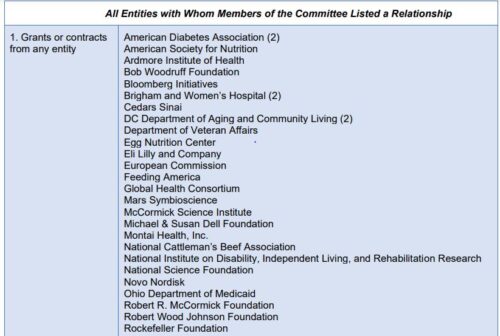Join Health Affairs for a virtual conversation between me and Angela Odoms-Young of Cornell University discussing the evolution of US food and nutrition policy, the current policy landscape, and thoughts on what lies ahead. It’s at 1:00 p.m. EDT. To join the Webinar, click here.
Dietary Guidelines Advisory Committee: conflict of interest disclosed, sort of
In a strange partnership, the Nutrition Coalition and the Center for Science in the Public Interest (CSPI) are jointly complaining about the way the USDA and HHS have “disclosed” conflicts of interest among members of the 2025-2030 Dietary Guidelines Advisory Committee.
Why strange? Because the Nutrition Coalition has long urged relaxations on advice about dietary fat, whereas CSPI has long urged restrictions.
Why “disclosed” in quotes? Because the agencies’ disclosure statement lists the combined conflicts for the entire group, not for individual members of the committee.
Here’s the committee, courtesy of a tweet from Christopher Gardner.
Dietary Guidelines Advisory Committee
2nd in person meeting of DGAC this week.
Committee members are a pleasure to work with – thoughtful, critical, informed group.HHS/USDA staff supporting the effort are an incredible resource! Wow!
2-year process is off to a great start! pic.twitter.com/6Cx5npxJcH
— Christopher Gardner (@GardnerPhD) May 13, 2023
Here is a small part of what the disclosure list looks like.

Because these are all jumbled together, you have to look hard to pull out the genuine conflicts—-relationships of committee members with food companies with vested interests in the outcome of the guidelines.
The Nutrition Coalition points out that USDA and HHS are failing to:
- Comply with a National Academies of Science report calling for publicly posting financial and nonfinancial biases and conflicts of interest of committee members.
- Fully adopt the National Academies’ 11 recommendations.
- Recognize the significance of the first-ever systematic review of a DGAC’s financial ties. This review found 95% of the 2020 DGAC members had at least one tie with a food or pharmaceutical company and half had 30 such ties or more.
In its statement, CSPI says that it, the Coalition, and 13 other groups are calling on the federal government to disclose potential financial conflicts of interest, including sources of research funding, speakers’ fees, and other relationships.
Press coverage, the statement says, “has already uncovered one 2025 Dietary Guidelines Advisory Committee member with a conflict of interest that seems relevant to their role.”
Comment: I agree that the credibility of the committee and the guidelines depends on transparency, but it’s hard to know how much of a problem this is.
I wanted to compare the disclosure list to the research questions set by the agencies for the committee, but I can no longer find them online.
This reminds me that’s it’s hard to know how much influence the committee will have, in any case, now that the agencies set the research questions and write the actual guidelines.
The advisory committee is just that, advisory. The agencies do not have to take its advice.
I will be following this closely. Stay tuned.
Additions, May 17 (thanks to Jerry Mande)
- The original list of Proposed Scientific Questions
- The list as posted on the current website: Step 3: Advisory Committee Reviews Scientific Evidence

